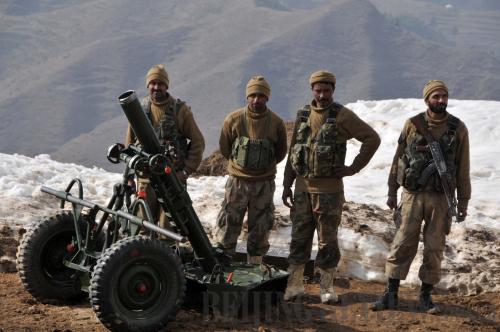|
 |
|
REMAINING VIGILANT: Pakistani soldiers maintain a mortar piece in the mountainous Swat Valley in northwest Pakistan on February 25, 2008. Although the region has long been a redoubt for Taliban militants, Pakistani counterinsurgency operations have turned the tide against them L(I ZHONGFA) | Pakistani and Indian foreign secretaries are scheduled to meet in New Delhi on February 25. How do you interpret the significance of this meeting?
I think it is an important development, because it was India that had suspended the dialogue after the Mumbai attacks in 2008. Pakistan was never shy of engagement. Pakistan always felt the Composite Dialogue was a useful process, and there was an understanding between Pakistan and India to keep the peace progress going to an extent that it becomes irreversible.
There was also an understanding that any act of terrorism will not impede the peace process. Pakistan is a victim of terrorism itself. We have such events on a daily basis in Pakistan and we are facing them.
We want good neighborly relations with India. We want normalization. We feel there are huge challenges that both countries face—economic challenges and social challenges. We should minimize tensions in the region.
Against a backdrop of sustained growth in the South Asian region, what are Pakistan's overall plans to boost economic and social development?
Pakistan has got to a difficult economic period. Perhaps we had ignored certain areas. By ignoring them in the past, we are paying an economic price today. For example, if we had invested at the right time in the energy sector, we would not be facing an energy deficiency today. If we had invested in the water sector 10 years ago, we would not have the water scarcity problem that we are facing today. If we had invested in physical infrastructure, which is a prerequisite for economic development, obviously our capacity for growth would have been enhanced.
When this government came into office, the macroeconomic indicators were disturbed. We have now developed an indigenous strategy and put in place a nine-point program for the economic stabilization of Pakistan. That program was endorsed by the International Monetary Fund (IMF). Pakistan today is being helped by the IMF to stabilize its economy.
The World Bank and the Asian Development Bank, seeing the potential of the Pakistani economy, have also agreed to help.
How would you comment on China-Pakistan cooperation on project collaboration?
Our relationship with China is very important. The projects that have been put in the pipeline in the last two years are very serious projects. For example, we have a huge water problem, and China and Pakistan have signed a memorandum of understanding on building 12 small to medium-sized dams. This is a big step forward. China is helping Pakistan build hydropower projects to address the energy deficiency in Pakistan.
The fact that China is helping Pakistan in developing new hybrid varieties of cotton, paddy and oil seeds can bring about an economic revolution in Pakistan by increasing the purchasing power of farmers. Considering that we are an agrarian economy and most people live in rural areas, that is in fact a great leap forward we are going to take.
With friends like China coming in to help us in key areas, I see things changing for the better in Pakistan. Inflation and fiscal deficits have already started going down. Foreign exchange reserves have already started going up. I'm positive that in the days to come, we have a huge potential of economic recovery.
Pakistan has demonstrated in the past we could grow at 6 to 7 percent per annum, but right now it has come down to 2 to 3 percent. I think very quickly, with a bit of luck, we can go back to 6 to 7 percent of economic growth.
A Frequent China Visitor
Pakistani President Asif Ali Zardari has paid four visits to China since taking office in September 2008:
During his first visit a month after assuming office, he met with top Chinese leaders, including President Hu Jintao and Premier Wen Jiabao, in Beijing.
In February 2009, he visited Hubei Province and Shanghai, familiarizing himself with China's agricultural technology, hydropower development and financial industry.
In April, he attended the Boao Forum for Asia in Boao, Hainan Province.
In August, he visited Hangzhou, capital of Zhejiang Province, and Guangzhou, capital of Guangdong Province, in a bid to cement Pakistan's business ties with these provinces.
| 